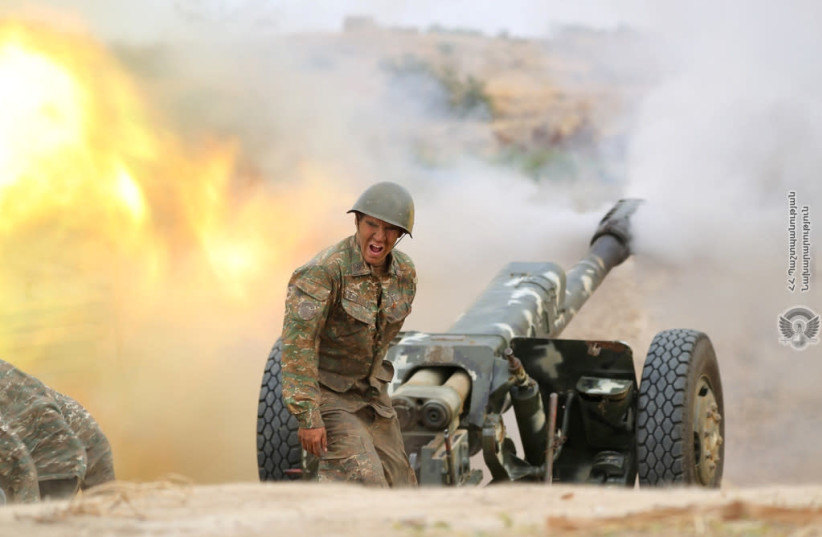Azerbaijan on Tuesday said it has launched “anti-terrorist activities” in the Nagorno-Karabakh region to restore constitutional order and drive out Armenian military formations. The move could foreshadow a new war in the region.
Loud shelling was audible on Tuesday from unverified social-media footage filmed in Stepanakert, the capital of Karabakh, which is called Khankendi by Azerbaijan.
Azerbaijan’s Defense Ministry said it intended to “disarm and secure the withdrawal of formations of Armenia’s armed forces from our territories [and] neutralize their military infrastructure.”
It was only targeting legitimate military targets, using “high-precision weapons,” and not civilians, in an effort to “restore the constitutional order of the Republic of Azerbaijan,” it said in a statement.
Civilians were free to leave through humanitarian corridors, including one to Armenia, it added.

Two civilians had been killed, and 11 people were wounded, in attacks by Azerbaijan’s military, the separatist human-rights ombudsman in the ethnic Armenian-controlled Azerbaijani enclave of Nagorno-Karabakh said Tuesday.
Armenia’s Defense Ministry said its armed forces were not present in Karabakh, adding that the situation on its own border with Azerbaijan was stable.
The EU on Tuesday condemned the military escalation in Karabakh and called on Azerbaijan to stop its current military activities, EU foreign policy chief Josep Borrell said in a statement.
“There is an urgent need to return to dialogue between Baku and Karabakh Armenians,” he said. “This military escalation should not be used as a pretext to force the exodus of the local population.”
The EU remained fully engaged in facilitating the dialog between Azerbaijan and Armenia, Borrell said.
Freelance journalist Thomas Van Linge wrote about the current fighting on Tuesday morning: “Nagorno Karabakh: scenes of panic in the streets of Stepanakert. People run for cover as artillery strikes can be heard in the back. Children are experiencing some of the most terrifying moments of their lives.”
Azerbaijan’s Defense Ministry said it has “repeatedly stated that contrary to the provisions of the Trilateral Statement signed on 10 November 2020, the continued presence of Armenia’s armed forces formations in the Karabakh region of Azerbaijan is the source of grave threat to regional peace and stability.”
The Armenians in Nagorno-Karabakh, which they call the government of Artsakh, said in statement: “Recently, the Azerbaijani side has been carrying out daily troop transfers and stockpiling of various weapons, which were accompanied by intensive information and propaganda activities, preparing the ground for large-scale aggression against Artsakh. The Artsakh side constantly warned all actors in 2020 about the indisputable fact of Azerbaijan’s unprecedented accumulation of military power after the war and possible provocations, including in the hope of preventing large-scale military actions.”
Azerbaijan recently tested an air-defense system as a message to Tehran and the region that it has sophisticated air defenses.
Over the past year, US and Western officials have warned about the need to have humanitarian access to Nagorno-Karabakh. A road through the Lachin corridor has been blocked by Azerbaijan, and Baku insists any aid should go through a different route rather than via Armenia.
Azerbaijan said it has informed Russian peacekeepers about its activities. Nagorno-Karabakh used to be linked to Armenia until the 2020 war. Now, it has been blockaded over the past year and has almost no access to the outside world.
Russia was supposed to guarantee a ceasefire, but Moscow is focused on a war in Ukraine, and Russia’s interests are to have Armenia and Azerbaijan in a low-level conflict so that it can broker deals with both. Turkey backs Azerbaijan.
Iran has expressed concern that any conflict could lead to changes along its border, and Tehran wants to keep its connections to Armenia for trade and other reasons. This creates a complex conflict zone in the South Caucasus. Azerbaijan is also important for Europe due to energy and trade.
Armenia-Azerbaijan conflict and the history of Nagorno-Karabakh
Internationally recognized as part of Azerbaijan, Karabakh has an overwhelmingly ethnic Armenian population and broke from Baku’s control in the early 1990s after a war.
Azerbaijan recaptured swaths of land in and around it in a 2020 war, but ethnic Armenian authorities who see the area as their ancestral homeland remained in control of part of Karabakh, including its capital.
A ceasefire deal brokered by Russia and enforced by Russian peacekeepers has remained fragile ever since, however, with frequent shelling and mutual accusations.
Armenia has accused Moscow, which is embroiled in its own war in Ukraine, of being too distracted to be able to guarantee its security.
